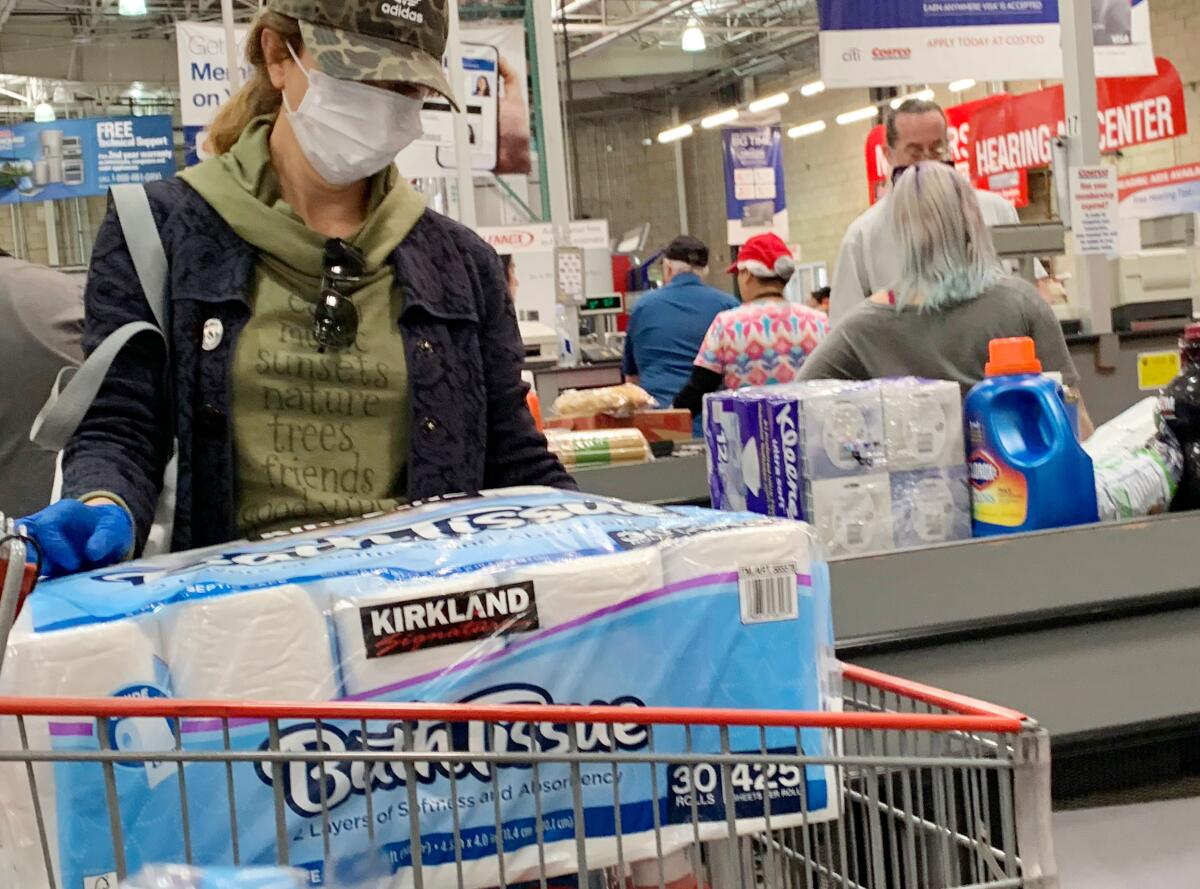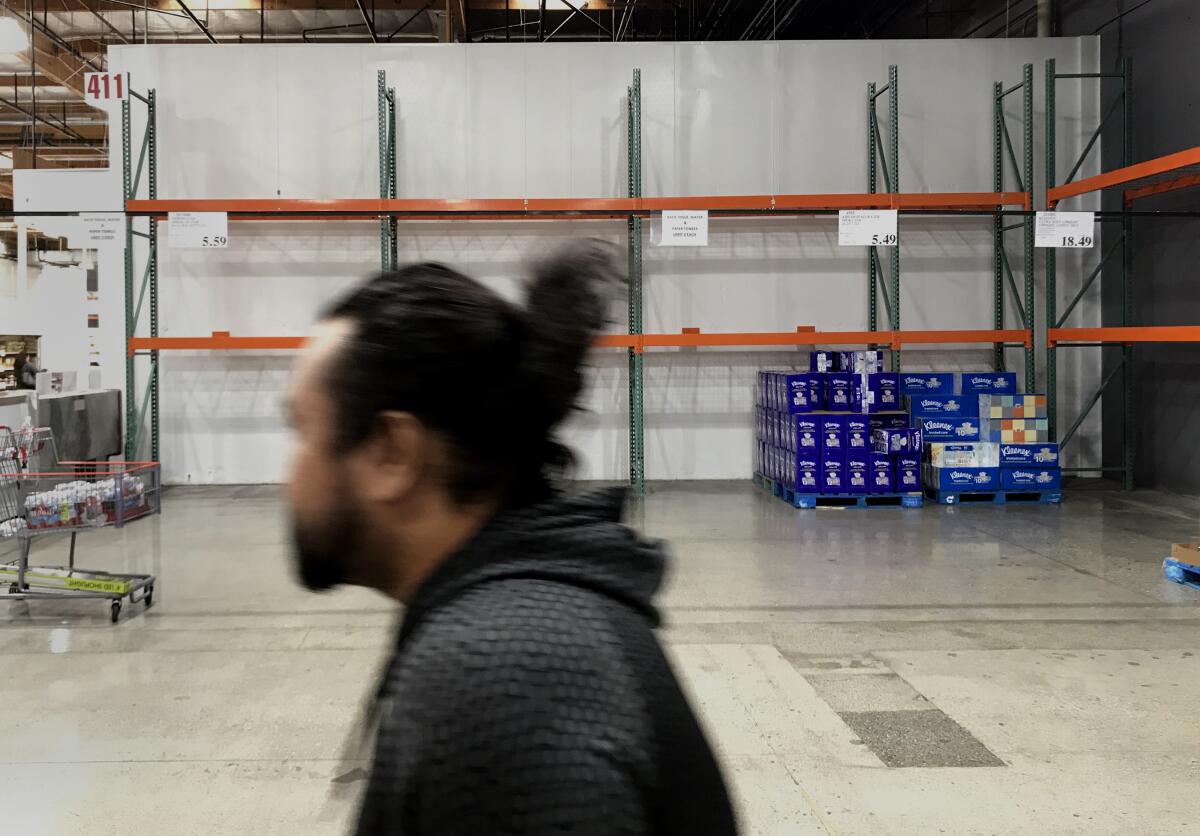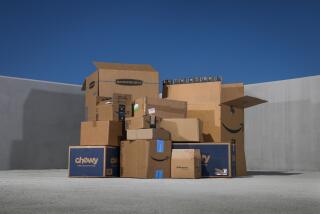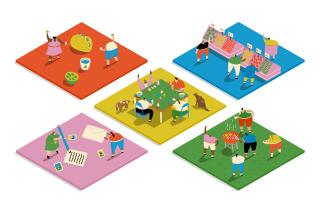Column: To assuage coronavirus fears, we need softness and strength. In other words: Toilet paper

- Share via
I could see the frustration building on my neighborhood NextDoor page: Costco had run out of toilet paper — again. How are we supposed to survive COVID-19 without 60 rolls of toilet paper socked away in the closet?
Thank goodness Costco seems to restock every morning. And since managing a medical crisis by hoarding toilet paper made no sense to me, I joined the hordes at my local Costco last weekend to see what I was missing.
I got there a few minutes before the store opened, and every single space in the parking lot was already taken. People had been queuing up for hours, desperate for a chance to purchase the two giant packages of toilet paper that each shopper was allowed.
“Why do we do this? It’s a panic,” said the stylish woman I approached in the parking lot as she and her husband were cramming their haul into the back seat of their Lexus.

Like most people I talked to, she knew others might consider them foolish or selfish, so didn’t want to give her name. “We’re preparing for the worst,” she said as her husband tried to wave me off. “If nothing happens, well …” She shrugged and let the thought die.
She told me she wasn’t worried about getting the virus, but about the prospect of long-term quarantines. “We’re scared,” she said as her husband hustled her into the car.
It was clear to me as I wandered the parking lot that the fear was real.
And all around the world, people are responding in much the same way. In just about every country with coronavirus cases, stores are struggling to keep toilet paper on the shelves.
We’re in the next phase now
When you really think about it, the rush to stock up, and the hoarding that occurs, is not as strange as it might seem.
This is not about prevention anymore. We’re in the next phase now: preparation for catastrophe.
People are looking ahead — to when schools close down and kids are home and nobody is allowed to step foot outside the house for weeks because somebody at your church, or on your flight, or behind you in the Costco line tested positive for COVID-19.
“The news says you may have to be prepared for several weeks of quarantine,” said Tina Wilson as she unloaded a few essentials — but no toilet paper — from her cart. There’s an “overload of information [that] heightens the sense of being scared.”
She and partner Jennifer Best are “old school,” she said. They feel prepared and will roll with whatever comes. “Our kids are more worried than we are,” said Best.
They hadn’t expected Costco to be so jammed. But the crowd soon thinned. Even with a two-package limit, the store sold out of both toilet paper and water in the first hour.
That held a certain kind of irony for Best. The store can’t keep up with the demand for toilet paper, “but the shelves with the hand-washing soap, they’re still very full,” she said. “What does that tell you?”
It tells me that, in the face of an unpredictable epidemic, toilet paper has become an unlikely totem of order and cleanliness, a way to outlast a dreaded disease and be comfortable as you attend to life’s most basic needs.
Psychologists who study consumers in crisis explain it like this: Uncertainty around the virus drives us into panic mode, and we look for a way to stifle the anxiety that provokes.
We fixate on toilet paper not just for its utilitarian value, but also because accumulating an overload — imagine a tower of toilet paper packages in your garage — provides a reassuring visual cue: You’re equipped for a long quarantine.
As people begin to raid the stores, the contagion feeds on itself. The sight of all those empty toilet paper shelves begins to stoke a new wave of panic in those of us who haven’t loaded up.
Or as London behavioral science professor Dimitrios Tsivrikos cast it for Britain’s Sky News: “If we had an international sign for panic, it would be a traffic warning sign with a toilet paper roll in the middle.”
Anxiety and relief in the Costco line
That sign would have suited the scene outside Costco in Northridge last Saturday. People queued up for toilet paper and water were like lines of traffic merging onto the freeway, steered into the proper lanes by Costco employees.
Inside, there was a line for toilet paper and another for water; employees guarded the intersection of aisles, so no one could cut the lines. If you didn’t want toilet paper or water, you just had to wait and watch as their carts rolled by. At the rear of the store, managers with walkie-talkies policed the “distribution sites.”
I had never seen the store so crowded or the shoppers so intense. But the whole process seemed remarkably well organized and orderly.
I could feel the anxiety rise as shoppers neared the distribution points and eyed shrinking supplies. I could see relief in customers’ faces as they pushed now-packed carts past empty shelves in their single-file line.
As I roamed the aisles, my mind flashed back to the aftermath of the 1994 Northridge earthquake, when I was too panicked by aftershocks to return with my daughters to our damaged house. We lined up with countless others in the park for bottled water and a bag of provisions that were supposed to restore a sense of normalcy.
I don’t recall if toilet paper was in that bag. But I do know now that the best talisman in a period of crisis may be the inexorable passage of time.
More to Read
Sign up for Essential California
The most important California stories and recommendations in your inbox every morning.
You may occasionally receive promotional content from the Los Angeles Times.












